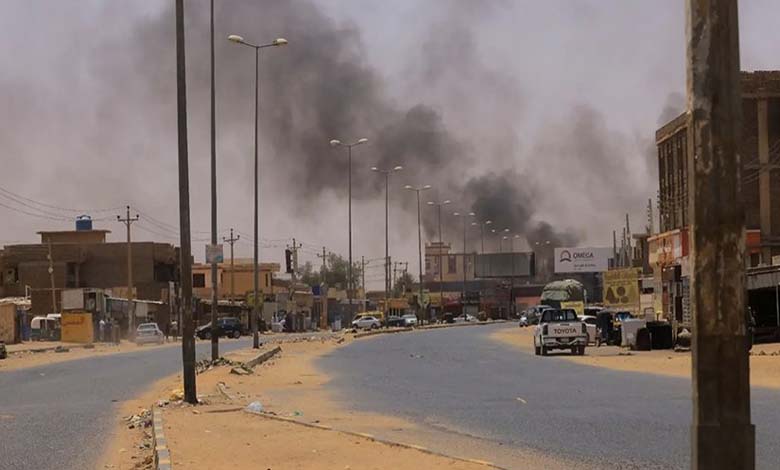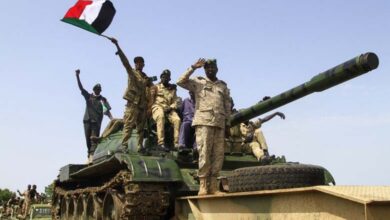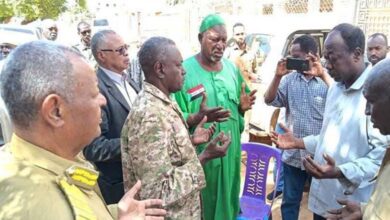Why is the Sudanese Army focusing on destroying the Capital?

The Sudanese Armed Forces have launched devastating attacks on several government buildings, including key ministries in the capital, Khartoum. This appears to be a scorched-earth policy in response to the Rapid Support Forces tightening their grip on the General Command headquarters, as part of President Abdul Fattah al-Burhan‘s plan to transform the capital into Port Sudan. This comes after consecutive defeats, especially the loss of the strategically important city of Um Ruwaba, and discussions within the Sovereign Council about forming a war government.
It is believed that al-Burhan aims to block the path of General Mohamed Hamdan Dagalo (Hemedti), the leader of the Rapid Support Forces, who has hinted at forming a civilian authority in his areas of control if a government is formed by al-Burhan, warning against divisive plans similar to those in other countries.
Turning Khartoum into a Devastated City
The attacks targeted several prominent buildings in the heart of the capital, including offices of sovereign institutions and ministries. The objective is to turn Khartoum into a ruined and marginalized city, diverting attention to Port Sudan as a new administrative capital. This plan reveals the intentions of the former regime and the dissolved Popular Congress Party to destroy the capital and render it incapable of hosting any government to achieve narrow political goals, while opening the door to division plans.
The Rapid Support Forces have condemned the scorched-earth policy, stating that it is reminiscent of the ousted regime’s tactics in various parts of Sudan.
The forces under al-Burhan‘s command, along with remnants, continue deliberate bombardments of infrastructure .and densely populated areas with explosive barrels. These actions, targeting the resources of the Sudanese people. only strengthen our forces’ determination to uproot this terrorist regime and pave the way for our people to build a new state based on justice and equality.
Justifying Defeat through Destruction
The deliberate destruction of vital infrastructure and the targeting of innocent civilians following each defeat of the remnants is an attempt to justify their blatant failure on the battlefield.
Yesterday, after their defeat in armored warfare. they shelled civilians in May South Khartoum, the Haj Youssef area in East Nile. and Nyala city in the west of the country. The remnants have no choice but to either surrender completely in their remaining positions or await their inevitable fate, which is now imminent. Deceptive propaganda campaigns will not alter this course.
Destruction and Desolation
Video footage on social media platforms showed flames engulfing prominent buildings, including the tower housing the offices of Nile Petroleum. one of the country’s largest oil companies.
The building, known for its glass facades and pyramid design, is a prominent landmark in the capital. The videos showed it nearly completely consumed by flames, with black smoke billowing from it.
Badr al-Din Babiker, a resident of East Khartoum, expressed his sorrow at seeing these institutions destroyed in this manner. questioning, “After all this destruction. what will be left for them to govern the country?”
Since the outbreak of the conflict in Sudan between the al-Burhan-led army and the Dagalo-led Rapid Support Forces on April 15th. around 7,500 people have been killed. with the actual numbers likely much higher. Approximately five million people have been forced to leave their homes and become internally displaced within Sudan or seek refuge in neighboring countries, especially Egypt and Chad.
About 2.8 million people have fled Khartoum, which has been subjected to aerial bombardment, heavy artillery. and street warfare. Hatem Ahmed, 53 years old. commented, “It’s as if they want to turn it into an uninhabitable city.”
The conflict has already devastated the already weak infrastructure and led to the closure of 80% of the country’s hospitals. plunging millions into a severe famine-like situation. Thick black smoke covered the skies of the Sudanese capital. Images shared on social media showed shattered windows in several buildings in central Khartoum. with bullet holes in their walls.
Witnesses in the May neighborhood in South Khartoum reported hearing heavy artillery shelling on the positions of the Rapid Support Forces in the adjacent Sports City area. Last week, at least 51 people were killed in shelling that targeted a market in the May neighborhood, according to the United Nations.
On Sunday, a committee of lawyers supporting democracy condemned the deaths of dozens of civilians in the ongoing battles since Friday. In North Kordofan state, about 350 kilometers west of the capital, the army and the Rapid Support Forces exchanged artillery fire on Sunday, as the latter managed to gain control of the strategically important city of Um Ruwaba, which could cut off the army’s supply routes.
In the early 2000s, Darfur was the scene of a protracted conflict that resulted in 300,000 deaths and the displacement of more than 2.5 million Sudanese. according to the United Nations.












